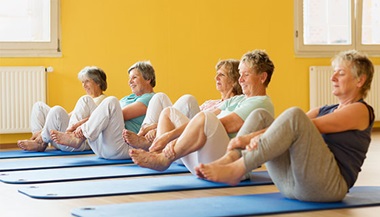Exercise and the Heart
Exercise has many positive effects on heart health. A regular exercise routine can help:
- Lower blood pressure
- Lessen risk of developing diabetes
- Maintain healthy body weight
- Reduce inflammation throughout the body
Experts say one of the key benefits of exercise is that it helps to control or modify many of the risk factors for heart disease. Smoking is another big factor for heart disease, and research indicates people who exercise regularly are unlikely to take on or continue a bad habit such as smoking.
Exercise also:
- Improves the muscles’ ability to pull oxygen out of the blood, reducing the need for the heart to pump more blood to the muscles
- Reduces stress hormones that can put an extra burden on the heart
- Works like a beta blocker to slow the heart rate and lower blood pressure
- Increases high-density lipoprotein (HDL) and helps control triglycerides
A number of studies have also shown that people who exercise regularly are less likely to suffer a sudden heart attack or other life-threatening cardiac event.
While exercise has benefits in and of itself, the best way to prevent heart disease is to combine exercise with a healthy diet. Exercise alone can help with weight loss over a long period of time. But a short-term approach is to reduce the number of calories you take in through diet, while increasing the calories you use through exercise.
Ideal Exercise for the Heart
The best exercise has a positive effect on the heart and improves the musculoskeletal system.
The American Heart Association and the American College of Sports Medicine both recommend combining aerobic exercise (jogging, swimming, biking) with resistance training (moderate weightlifting). Together, these two categories of exercise produce the greatest benefit for preventing and managing heart disease.
Exercise and Pregnancy
If you’re having a healthy pregnancy and you exercised regularly before you were pregnant, it’s beneficial to keep up a moderate routine. This regimen can include walking, swimming or bike riding. You’ll continue to receive the same cardiovascular benefits.
If you’re pregnant and everyday exercise has not been part of your life, you should probably stick with a milder exercise. In both instances, it makes sense to seek advice from your physician.
Sources for Exercise Intelligence
The National Institute of Health, the American Heart Association, and the American College of Sports Medicine are all good sources for assistance in choosing the right exercise routine.
Johns Hopkins’ clinical exercise center offers medically supervised programs and exercise guidelines based on scientific evidence. They evaluate fitness levels and consider medical history before starting people on exercise regimens. There are similar medical fitness centers throughout the country.
How Much Exercise and How Often?
General guidelines call for a combination of aerobic exercise and resistance training. Try to get in a minimum of 30 minutes of aerobic exercise such as walking, cycling or swimming at least five days a week. Do moderate weightlifting to tone muscles and build muscle endurance twice a week, or frequently enough to cover the major muscle groups.
How do you know when you’re making progress?
There are many ways to chart your exercise progress. Three of the most common are target heart rate for aerobic exercise, number of repetitions for weight training, and fat vs. muscle body composition.
- Target heart rate – The more fit you are, the harder you’ll need to work to reach your target heart rate. For example, in the first month you may need to walk 3 mph to reach a heart rate of 120, while in the second month in order to reach the same heart rate, you need to walk 4 mph or find a steeper hill. Your fitness is improved and your heart is working more efficiently.
- Reps – The more weight you can lift 12-15 times without straining, the stronger and more durable your muscles are. For example, you start out struggling to curl a 15-lb. dumbbell 15 times, and then add three to five pounds when it becomes easy.
- Body composition – Exercise more and your body will change shape: you’ll lose fat, specifically around the waist, and gain muscle. A looser pair of pants or skirt is a distinct sign of progress.
Know when you’re overdoing it
Setting a target heart rate with a qualified trainer or health professional is the simplest way to keep your workout within a healthy range.
- Stay within your target heart rate, and you’re working out at the right level.
- Go above your target heart rate, and you’re probably working too hard.
- Stay below your target, and you’re not working hard enough to gain the most cardiovascular benefit.
An important sign of overwork is fatigue and soreness that stays with you longer than a day or two after you exercise. Any persistent pain could mean you’ve overused or have injured a muscle.
How to Stick with an Exercise Routine
The key to a successful exercise routine is staying interested and motivated. Here are a few ways to keep exercise a lifelong habit:
- Set aside a specific amount of time each day for exercise and work it into your schedule.
- Work out with a friend or join a gym and work out in a group. Either scenario creates mutual support and healthy competition to keep things interesting.
- Keep a simple log to chart your progress.
- Create your own record or graph on a spreadsheet or use one of the many programs available on the internet.
- If you jog or cycle, use a heart rate meter or speedometer to help you set and reach goals.
Use exercise to tune up your cardiovascular health
When researchers test a person’s initial fitness and then again three to six months later, they see progress. The subjects’ oxygen consumption will be higher. Their time on the treadmill will be longer. Their heart rate and blood pressure will be lower. Exercise can be like tuning up the engine that is your heart and the body’s circulatory system for distributing blood and ensure it’s working efficiently.
Johns Hopkins Women's Cardiovascular Health Center







